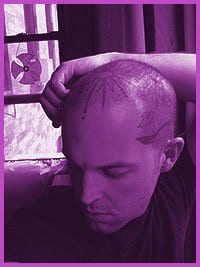Daniel Cartier’s live performances are infamous.
The critically acclaimed singer-songwriter has performed just about everywhere from New York City subway platforms to some of the most respected and well-known North American and European stages.
In fact, Cartier says he frequently performs live in his own shower.
“And if I could sell tickets to that, not only would it be hot, but the shower is my best audience,” he says over the phone from a friend’s house in Los Angeles, before driving to San Francisco for his next show. “I’m surprised I haven’t hurt myself yet, because I’m singing and dancing around in there all the time. My favorite place to sing is in the shower.”
When Cartier takes to a drier, more traditional stage during this year’s Ottawa Pride festival three times in all, including a performance during The Big Shiny Ball the New Hampshire native will be showcasing songs from his new album, Revival, an eclectic mix of smart folk-pop and dance club rhythms.
It will also mark the promising out artist’s return to the mainstream musical road after a long hiatus.
Cartier put himself on the musical map several years ago, when his breakthrough album, Avenue A, was released on Elton John’s Rocket Records in 1997. The record – and his live performances in support of it – received rave reviews. But, after his label’s parent company Polygram was part of a corporate takeover, hundreds of artists lost their deals – and Cartier was one of them.
“It’s a very hard thing for an artist to bounce back from,” says Cartier of being dropped by his label.
Then, three years ago, while attempting to address the direction of his musical career and a chaotic personal life, Cartier suffered a self-described “meltdown.” So, the New England boy left the iron and asphalt of New York City for the surf and sand of Cape Cod.
“Literally, I just ended up on my best friend’s couch overnight. And from there, I just started building a life [in Cape Cod]. It’s like my life changed overnight,” he says.
After setting down roots on the island, Cartier continued to write and perform, but on a more local musical scale. He also began to paint, completing enough canvases – and drawing enough interest – to have his own show in New York City’s trendy Chelsea gallery district.
Recently, he built a recording studio in the home he now shares with his current partner, Christian, on the Cape. It was here he made his last two albums, including the self-produced and aptly titled Revival.
In addition to the new record, Cartier says he is also looking forward to his first North American tour in almost five years.
“I almost feel like the albums are a way of promoting your live shows in a way, really,” he explains. “The great thing about performing is every show is different and you never know what’s going to happen. People always say, ‘Describe your live show,’ but it’s very hard for me to do that, because it’s so all over the place all I know is that when I get offstage, I’m really wiped out.”
And as an openly gay musician, Cartier says not only is he ready to reenter the mainstream musical world again – that world may be finally ready for him.
“A big part of what I do is the fact that I am a gay guy who has been in the music industry, who has seen it from all different sides – I’ve been to the big offices of the major labels, I’ve been playing down in the subway – I mean, I’ve literally seen the whole thing,” he says.
Cartier adds that when he was first signed to his major label deal in the mid-1990s, while not denying his sexuality, his label went out of the way not to emphasize the fact that he was queer.
“And now the music industry has changed so much, that, it’s like, ‘Oh my God, you’re gay, that’s a market,'” he says. “And, if there’s a built-in market that you can focus on, and get your music to, then that’s like a blessing because there’s so much music out there now.”
But, he says, it’s important “not to preach to the converted.”
“For me, to just go and play specifically gay things for the rest of my life, that’s something that doesn’t interest me, because I want to get out there and try to bring people together. I mean, first and foremost I’m a human being, and I don’t take that lightly,” he explains.
“I want a straight person to be able to hear my album and if there’s something they can get out of it, then that’s awesome. But, if it’s the fact that I’m gay and they want to hear gay artists, then, yeah, I’m wicked gay – here I am.”

 Why you can trust Xtra
Why you can trust Xtra


